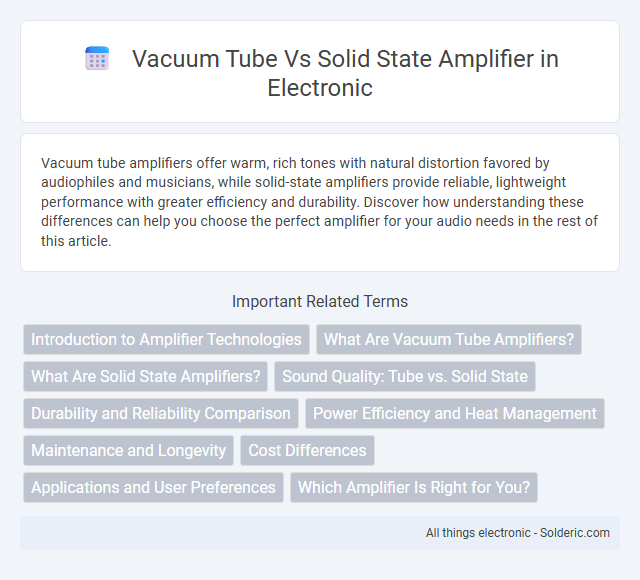Vacuum tube amplifiers offer warm, rich tones with natural distortion favored by audiophiles and musicians, while solid-state amplifiers provide reliable, lightweight performance with greater efficiency and durability. Discover how understanding these differences can help you choose the perfect amplifier for your audio needs in the rest of this article.
Comparison Table
| Feature | Vacuum Tube Amplifier | Solid State Amplifier |
|---|---|---|
| Technology | Uses vacuum tubes to amplify signals | Uses semiconductor transistors for amplification |
| Sound Quality | Warm, rich, and smooth tonal character | Clean, precise, and accurate sound reproduction |
| Durability | Fragile tubes; prone to wear and require replacement | Robust solid-state components with longer lifespan |
| Size & Weight | Larger, heavier design due to tubes and transformers | Compact and lightweight |
| Power Efficiency | Less efficient, higher power consumption | More efficient with lower power usage |
| Maintenance | Requires regular tube checks and replacements | Minimal maintenance needed |
| Cost | Generally more expensive due to tubes and vintage appeal | More affordable and widely available |
| Applications | Preferred for high-end audio, guitar amps, and audiophile use | Common in everyday electronics, home audio, and portable devices |
Introduction to Amplifier Technologies
Vacuum tube amplifiers use thermionic emission to amplify audio signals, offering warm, rich tones prized in music production and audiophile circles. Solid state amplifiers rely on semiconductor transistors, providing greater efficiency, reliability, and compact designs suitable for modern electronics. Understanding the fundamental differences in amplification technology helps you choose the best device for your audio needs.
What Are Vacuum Tube Amplifiers?
Vacuum tube amplifiers use thermionic tubes to amplify audio signals, creating warm, rich tones favored by audiophiles and musicians. These amplifiers rely on vacuum tubes to control electron flow, offering distinct harmonic distortion and smooth sound characteristics. Your choice between vacuum tube and solid-state amplification depends on the desired audio quality and tonal preference.
What Are Solid State Amplifiers?
Solid state amplifiers use semiconductor devices such as transistors and diodes to amplify audio signals, offering greater reliability and efficiency compared to vacuum tubes. These amplifiers are known for their compact size, durability, and lower manufacturing costs, making them popular in modern audio equipment and guitar amps. Solid state technology provides clean, precise sound reproduction with minimal maintenance, contrasting with the warmth and distortion often associated with vacuum tube amplifiers.
Sound Quality: Tube vs. Solid State
Vacuum tube amplifiers deliver warm, rich sound with natural harmonic distortion, often preferred by audiophiles and musicians for their smooth, musical tonal character. Solid state amplifiers provide cleaner, more precise sound reproduction with higher fidelity and lower noise levels, making them ideal for accurate sound monitoring. The choice between tube and solid state amplifiers depends on the desired audio signature, with tubes offering organic warmth and solid state emphasizing clarity and reliability.
Durability and Reliability Comparison
Vacuum tube amplifiers offer a warm sound but typically have shorter lifespans due to fragile glass tubes prone to breakage and wear over time. Solid state amplifiers feature enhanced durability with robust semiconductor components that resist physical shock and temperature variations, providing higher reliability in demanding environments. Maintenance requirements are lower for solid state amps, making them more consistent for long-term use in professional audio setups.
Power Efficiency and Heat Management
Vacuum tube amplifiers generally exhibit lower power efficiency, converting a significant portion of energy into heat, which requires effective heat management through ventilation or cooling systems. Solid state amplifiers offer superior power efficiency, producing less heat due to their use of transistors, making them more reliable and easier to maintain. Understanding these differences helps you choose an amplifier that meets your needs for performance, durability, and operational cost.
Maintenance and Longevity
Vacuum tube amplifiers require regular maintenance, including tube replacement and bias adjustments, due to their fragile glass components and heat sensitivity. Solid state amplifiers have longer lifespans with minimal upkeep, as their semiconductor components are more durable and less prone to wear. The cost of maintaining vacuum tubes can be higher over time compared to the reliable, low-maintenance nature of solid state amplifiers.
Cost Differences
Vacuum tube amplifiers generally cost more than solid state amplifiers due to their complex manufacturing process and the premium materials used. Solid state amplifiers benefit from mass production and advanced semiconductor technology, making them more affordable and accessible for most users. When considering your budget, solid state models typically offer better cost efficiency without compromising performance for everyday applications.
Applications and User Preferences
Vacuum tube amplifiers are favored in high-fidelity audio equipment and guitar amplifiers due to their warm, natural sound and harmonic distortion characteristics that appeal to audiophiles and musicians. Solid state amplifiers are preferred in portable, low-maintenance applications like home theaters and professional sound reinforcement because of their durability, efficiency, and lower cost. Your choice depends on whether you prioritize the classic tonal warmth of tubes or the practical reliability and compactness of solid state technology.
Which Amplifier Is Right for You?
Vacuum tube amplifiers are favored by audiophiles seeking warm, rich sound with natural distortion characteristics, ideal for guitarists and vintage audio enthusiasts. Solid state amplifiers offer reliable performance, lower maintenance, and greater efficiency, making them suitable for modern music production and portable sound systems. Choosing the right amplifier depends on your preference for tonal qualities, durability, and the specific application in home audio, live performances, or studio recording.
vacuum tube vs solid state amplifier Infographic

 solderic.com
solderic.com